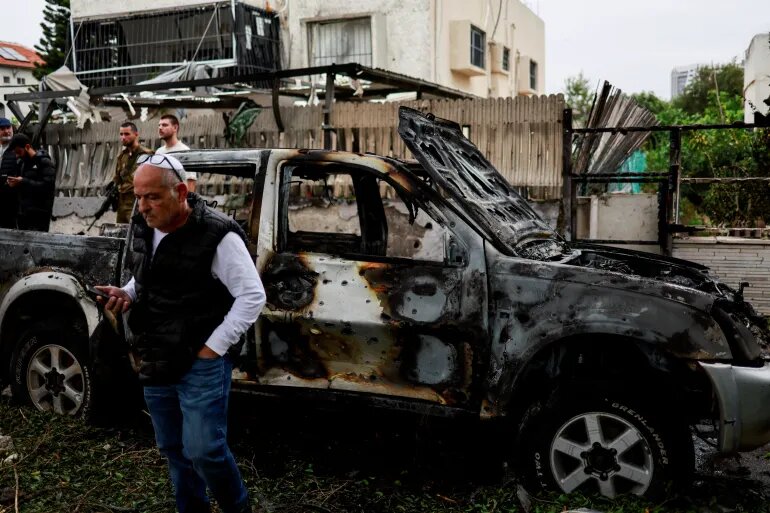Ceasefire or consequences: Israel's dilemma after Hezbollah's huge attacks

TEHRAN- Lebanon’s Hezbollah has once again demonstrated its military prowess by firing a record number of missiles and other projectiles into Israel in the face of the regime’s ongoing brutal aggression against the Mediterranean country.
The Israeli army admitted on Sunday that 340 missiles and drones had been launched from Lebanon.
In the wake of the missile barrage, sirens went off in Israel, forcing millions of people into shelters.
Hezbollah announced that it struck the Ashdod naval base in southern Israel “for the first time”.
The resistance movement noted that it also carried out an operation against a “military target” in Tel Aviv using advanced missiles and strike drones.
Hezbollah said it “launched, for the first time, an aerial attack using a swarm of attack drones on the Ashdod naval base” in southern Israel. Hezbollah further launched more than 50 attacks within the Lebanese borders on Israeli troops that were trying to advance inside the country’s territory.
The Hezbollah strikes came a day after more than two dozen people were killed in an Israeli strike in central Beirut which drew widespread condemnation.
The Lebanese caretaker premier condemned the Israeli strike as an assault on US-led ceasefire efforts, describing it a “direct, bloody message rejecting all efforts and ongoing contacts” to end the war.
“(Israel is) again writing in Lebanese blood a brazen rejection of the solution that is being discussed,” Najib Mikati said.
US envoy Amos Hochstein discussed the ceasefire proposal with Lebanese and Israeli officials during his latest trip to the region.
But Israel intensified its deadly strikes on Lebanon amid his regional visit.
The Lebanese government and Hezbollah have welcomed the US ceasefire proposal, although with some comments.
However, Prime Minister Benjamin Netanyahu has indicated that Israel would continue military operations against Hezbollah even if a deal is reached.
Reports suggest that the US-drafted agreement includes a 60-day transition period that would see the Israeli army withdraw from southern Lebanon. The Lebanese army would then be deployed along the border in southern Lebanon and Hezbollah would end its military presence in the area. The truce is believed to be in line with efforts to fully implement UN Resolution 1701 that ended the 2006 war between Israel and Lebanon.
Israel and Hezbollah began cross-border exchanges of fire a day after the regime launched war on Gaza on October 7, 2023. The resistance movement has conducted the attacks in solidarity with Palestinians in Gaza.
On September 23 this year, Israel escalated its airstrikes on Lebanon. The regime’s army also carried out a ground incursion into southern Lebanon on October 1.
Netanyahu has vowed to return those who have been evacuated from northern Israel in the wake of the exchanges of fire with Hezbollah to their residences.
The Lebanese Hezbollah resistance movement fired a record number of 340 missiles and other projectiles at Israel on Sunday forcing millions of people into shelters. Netanyahu has not only failed to make good on his promise but he has also been unable to deter Hezbollah’s attacks.
The firing of hundreds of missiles in a single day toward Israel indicates that Hezbollah’s military capabilities remain intact.
Hezbollah has also announced that its fighters have killed more than 100 Israeli troops and wounded over 1,000 others on the battlefield in southern Lebanon. The high number of Israeli army casualties shows that Hezbollah has the upper hand in ground battles.
The slaughter of Lebanese civilians is Israel’s sole achievement. The regime has killed more than 3,700 people in Lebanon since October last year.
The US ceasefire proposal is just an attempt to distract from Israel’s failed military strategies in Lebanon.
American and Israeli media have reported that Israel and Hezbollah are getting closer to reaching a deal.
It is now clear that Israel’s military setbacks in southern Lebanon could push the regime to bite the bullet and acquiesce to a ceasefire deal.
If Netanyahu agrees to a ceasefire, it will amount to conceding defeat to Hezbollah. But if he decides to prolong the war, his soldiers will have to pay a heavier price on the battlefield.
